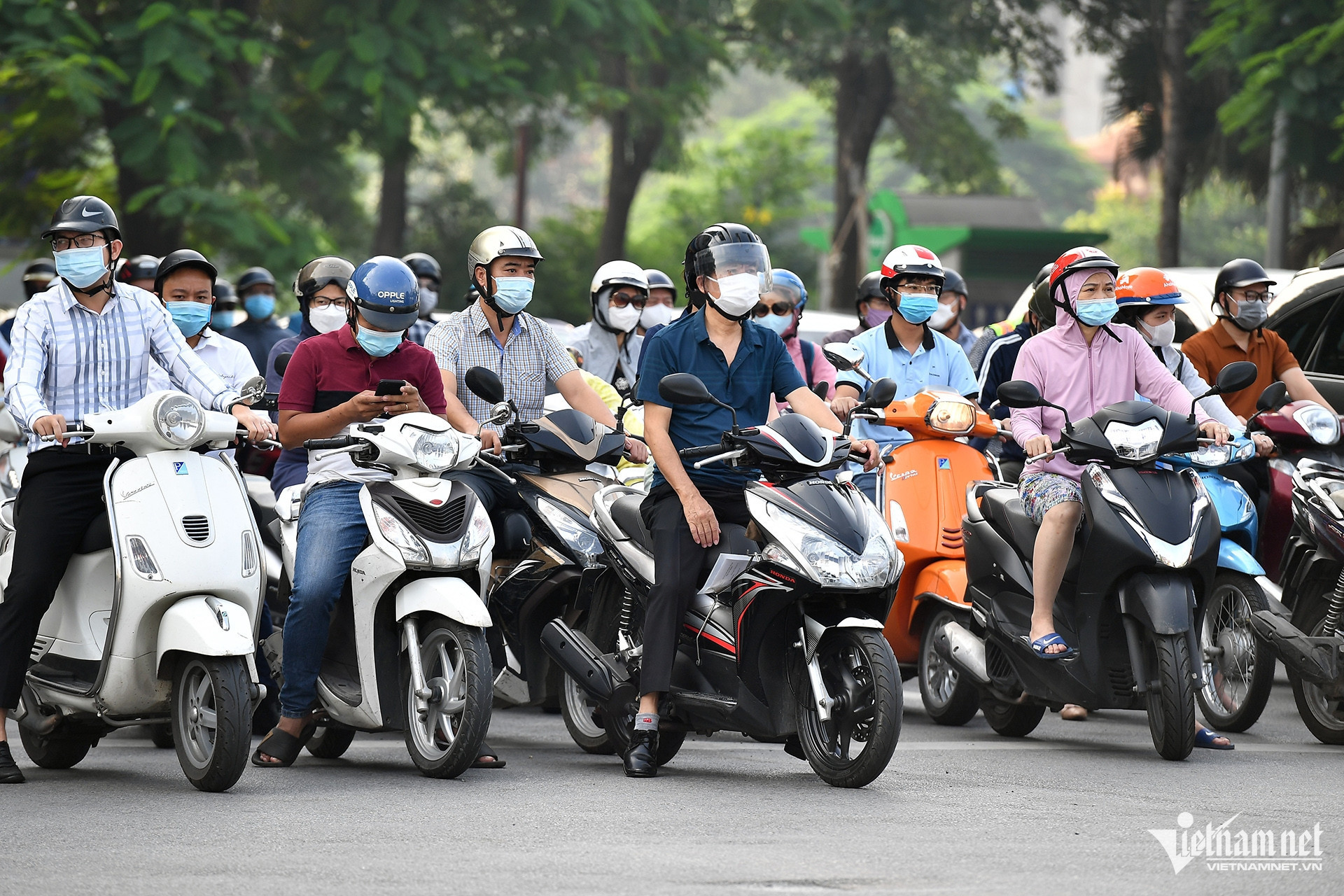
This regulation is outlined in Directive 20, issued by PM Pham Minh Chinh on July 12, 2025, requiring Hanoi to promptly develop an emissions control roadmap, moving toward eliminating fossil fuel-powered personal vehicles in the inner city.
From July 1, 2026, gasoline motorcycles will be banned within Ring Road 1, covering central streets such as Tran Nhat Duat - Tran Quang Khai - Tran Khanh Du - Nguyen Khoai - Minh Khai - Dai Co Viet - Xa Dan - Kham Thien - Le Duan - Van Mieu - Quoc Tu Giam - Dang Tat - Hang Dau - Phan Dinh Phung - Quan Thanh - Thanh Nien - Yen Phu - Cua Bac - Hang Dau - Tran Nhat Duat.
From January 1, 2028, in addition to banning gasoline motorcycles, fossil fuel-powered personal cars operating within Ring Road 1 and Ring Road 2 will also be restricted.
By 2030, the ban on fossil fuel-powered personal vehicles in Hanoi will extend to Ring Road 3, covering major streets: Pham Hung - Khuat Duy Tien - Nguyen Xien - Nghiem Xuan Yem - Phap Van - Linh Nam - Vinh Tuy - Minh Khai - Nguyen Khoai - Tran Khat Chan - Dai Co Viet - Giai Phong - Truong Chinh - Lang - Vo Chi Cong - Pham Van Dong - Thang Long Bridge.
The information was not surprising to many residents, as this roadmap was approved by the Hanoi People’s Council in 2017. Recently, during a meeting with motorbike manufacturers, Hanoi People’s Committee Chair Tran Sy Thanh reaffirmed the commitment to transitioning from fossil fuel to clean energy vehicles.
Under the Resolution on establishing a low-emission zone in Hanoi, effective from January 1, 2025, Hanoi will pilot a low-emission zone in parts of Hoan Kiem and Ba Dinh (formerly), expected to be announced in Q3 2025.
Polluting vehicles, including gasoline motorcycles not meeting emission standards, will face restrictions or will be required to pay fees to enter this area. The purpose is to limit personal vehicles, especially motorcycles, which account for a large share of urban traffic. This is also seen as a stepping stone for residents to adapt and prepare for broader bans.
Alongside the gasoline motorcycle ban, Hanoi is promoting public transportation systems like buses and urban railways, as well as policies to support residents in low-emission zones to switch to eco-friendly vehicles, such as subsidies for trading in old motorcycles for electric ones or incentives for environmentally friendly vehicles.
Currently, Hanoi has about 6.9 million motorcycles, 1.1 million cars, and 1.2 million out-of-province vehicles operating regularly. Within Ring Road 1, the central area, the daily number of motorcycles is extremely high, reaching hundreds of thousands or even millions of trips in and out, operating frequently.
Thus, banning gasoline motorcycles within Ring Road 1 will be a significant milestone, marking the complete ban on gasoline-powered motorcycles and scooters in Hanoi’s central area. This will impact a large number of vehicles and residents in this area.
Hanoi Mayor Tran Sy Thanh has many times affirmed the strong determination to implement the motorcycle reduction plan announced in 2017, unchanged for the four inner districts.
Thanh in early June met with the Vietnam Motorcycle Manufacturers Association (VAMM) to discuss solutions for transitioning from fossil fuel-powered motorcycles and scooters in Hanoi.
VAMM Chair Sayaka Arai, who is also General Director of Honda Vietnam, while applauding Hanoi’s plan, suggested that the city guide the production and use of cleaner gasoline vehicles, including limits on fuel consumption, EURO4 emission standards, biofuels, and emissions control for operating vehicles.
VAMM proposed that the city develop a suitable and feasible roadmap for transitioning as early as 2030. Currently, Hanoi’s charging infrastructure for electric vehicles is insufficient, leaving residents with only home or commercial center charging options.
This raises concerns about overloading the charging system, especially in old apartment buildings, potentially causing short circuits, fires, and safety risks.
Moreover, transitioning to electric motorcycles will require significant costs for residents, while the city lacks support policies.
Thanh emphasized that a city cannot develop modernly and civilly without a good environment and culture. Currently, motorcycle growth poses a significant challenge to the sustainable development of urban areas.
Vu Diep